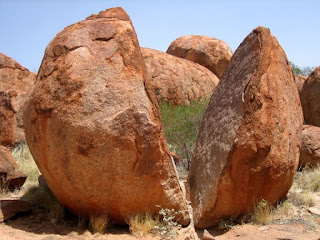Weathering is the chemical and physical change which occurs when rocks are exposed to weather. Soil is produced from rocks and minerals by the effects of air and water. It seems hard to believe that air can affect rock at all, but it is known that rock can be reduced to fine silt and sand in desert areas.
The main chemical change caused by air is oxidation. The oxygen in the air reacts with the minerals in a rock to form oxides, which are often loose and powdery. QUARTZ is about the only common mineral unaffected by air weathering. Feldspar and mica, two other common minerals in igneous rocks, contain aluminum, iron, and magnesium compounds. When these minerals are weathered, they form water soluble salts and clay. Further disintegration of the rock is caused by the abrasive, or wearing, effect of wind-and water-borne sand particles and pebbles. The weathering of most rocks is very slow; but weather can eventually remove entire mountain systems.
Water is very effective in mechanical weathering because it expands upon freezing. Water freezing in cracks in a rock can split off (exfoliate) pieces of the rock.
.
